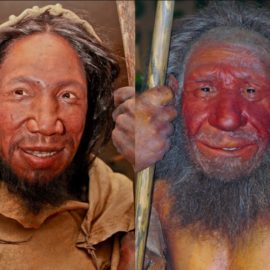
Have you ever wondered why you feel guilty for taking a break? Why do so many people believe their value depends on constant productivity?
The history of laziness reveals deep cultural roots stretching back centuries. Devon Price’s book Laziness Does Not Exist explores how harmful productivity myths became embedded in Western society and continue shaping our beliefs about work and worth today.
Keep reading to discover how these damaging ideas began and why they persist.
The Origins of Laziness
If our ideas about hard work and laziness are so harmful, then how have they become so widespread? In essence, we all learn these beliefs from a combination of early life experiences and societal messaging. Price describes the history of laziness by exploring how deeply the roots of these ideas are embedded in Western culture, particularly in the United States, and how they’re reinforced by pop culture, our teachers, our leaders, and even our parents.
(Shortform note: The societal messaging Price points to is impossible to avoid because it’s essential to how we learn to be human. In Maps of Meaning, Jordan Peterson explains that as children, we learn to decipher the world around us through the stories we’re told by those who raise us. Since the world is too much for one person to figure out, society’s collective solutions to problems become encoded in stories passed between generations, including our code for right and wrong. In the West, this includes the positive value of hard work, but Peterson warns against toxic stories that ignore the fact that everything has a good and bad side. An accurate social narrative would account for hard work’s negatives too.)
Price explains that the belief that your productivity equals your worth is inextricably linked with the rise of American capitalism. He traces it back to the Puritan settlers who brought with them the conviction that hard work in this life would be met with heavenly rewards. In the US, at least, it was the Puritans who first equated the quality and quantity of your work with character and moral fiber.
(Shortform note: The Puritans, whom Price identifies as the source of our modern fixation on work, were a religious group that began branching off from the Anglican Church in the 1500s. They were characterized both by the strength of their faith and their dedication to evangelism as key to their spiritual salvation. In 1630, after years of repression by the British government for their religious beliefs and the reforms they advocated, the Puritans migrated to the Americas, where they established a settlement in present-day Boston. Because Puritan values revolved around the community as a whole, and not just individual faith, they spread their message combining religious fervor and hard work throughout the American colonies.)
However, this outlook on the moral value of work took a dark turn when it was used to rationalize slavery—if so-called “lesser” people were inherently lazy, as the cultural lie dictated, then forcing them to work became a twisted form of redemption. Price says that another (possibly intentional) effect of the hard work mentality is that it kept workers too exhausted and busy to organize, rise up, and rebel against their oppressors.
(Shortform note: Price’s explanation of slavery’s rationale is only a slice of a larger picture, including the use of oppressive ideology against people other than enslaved Africans. In A People’s History of the United States, Howard Zinn states that ideals of white superiority existed before the slave trade, but they became dominant because of it. In addition to hard labor, wealthy elites promoted white supremacy to sow division between Black slaves and poor white laborers. They feared that if these groups worked together, they could overthrow the class system—which nearly happened in 1676. After quelling the rebellion, colonial elites formalized race-based segregation to prevent a similar uprising from happening again.)
Modernizing the Laziness Myth
Price says that as time went on, this belief system expanded—especially during the Industrial Revolution—to be used against any marginalized group, whether based on differences of race, culture, gender, or class. It even helped to shape our education system, in which the school day is modeled after the daily schedule of the average factory worker—which pushes many students so hard that their health suffers from the strain. Price argues that the echoes of this mindset remain in the modern business world, where hard work is viewed as an absolute good and any form of rest or self-care is sneered at as a sign of moral failure.
| Overwork by the Numbers The effects of our widespread overvaluing of work can now be measured scientifically. Recent research supports Price’s idea that places of learning push many students too hard. For instance, a 2023 compilation of numerous research studies found that nearly 35% of graduate students worldwide are suffering from clinical anxiety. The researchers also note that anxiety is often the first symptom of other disorders such as depression and obsessive-compulsive disorder. This suggests that universities are pressuring advanced degree students to the point that more than a third of them are suffering serious and potentially long-lasting harm. Meanwhile, a growing number of white-collar professionals are secretly growing their income by working multiple full-time remote jobs at once. In 2022, the Bureau of Labor Statistics reported that 5% of the US workforce held multiple jobs—a figure that jumps to 40% for those who work remotely. While such extreme productivity provides a solid income advantage, it opens workers up to burnout and detachment from their jobs. Exhaustion from overwork even hits those at the top of the corporate ladder—research in 2022 showed that over 80% of top executives suffer from overwork, suggesting that the toxic work ethic Price writes about has spread to every level of society. |
Spreading Myths About Laziness
Price argues that modern media and popular culture constantly reinforce the myth that accomplishment is everything. In movies and TV, we’re bombarded with tales of leaders and heroes who succeed through relentless hard work and sacrifice, whether in politics, business, or even fiction. The protagonist is always the brave visionary, the lone entrepreneur, or the dauntless fighter who overcomes countless odds through sheer grit. What Price says is missing from these stories is the value of rest, relying on others, and taking time to heal. Also missing from this message is the fact that the success of “great people” nearly always relies on the hard work of others who don’t get rewarded with fame and fortune for their efforts.
Given the messaging we’re constantly exposed to, it’s logical that we value work so highly. Price points out that as we grew up, we were taught that success through hard work is all that matters. We watched our parents work to put food on the table, while at school we were graded on our work every day, with successes earning praise and shortcomings marked as failures. We also watched adults blame people who fell short of society’s standards for their own misfortunes. Maybe a friend’s parents struggled with depression, couldn’t cover their bills, or faced some other hardship. Those we looked up to—like our parents and teachers—called these people lazy, implying that we should do anything to avoid that label ourselves.






